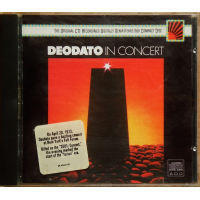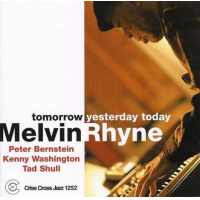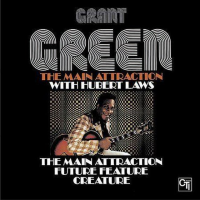Home » Jazz Articles » Liner Notes » Ralph Bowen: Keep the Change
Ralph Bowen: Keep the Change
Fast forward to the late '90s and once again I found Ralph lending his creative talents to the works of another great jazz discovery, pianist Orrin Evans. But somehow along the way it seemed as if Bowen was operating just below the radar, honing his skills and developing into an esteemed jazz educator, but not necessarily making a name for himself as a leader. A student of David Baker and Robert Dick, Bowen not only holds a Masters degree from New Jersey's famed Rutgers University, but since 1990 has been on the faculty and is currently associate professor of saxophone and music theory.
But while Bowen was studying formally and keeping active as a sideman during the '90s, he was getting further on-the-job experience by taking part in Philadelphia's healthy jazz scene. "I've learned a lot about the organic side of jazz through my experiences with musicians from Philadelphia," Bowen explains. "I started playing at Ortliebs and got to play with Shirley Scott and Mickey Roker and a whole host of legendary players and so Philly all of a sudden became like a second home to me. People like Trudy Pitts took me under their wings and I would play with her quite a bit, so that's become a very important part of my development without question."
It would be through his pilgrimages to Philly that Bowen would develop a budding friendship with the aforementioned Evans, a man that the New York Times has called "one of the best developments in jazz in the late '90s." As Bowen puts it, "We've developed a strong vocabulary musically, but also personally over the past decade or so." Utilizing the various woodwind instruments in his arsenal, Bowen has played a supporting role on Evans' Captain Black (Criss Cross 1154), Grown Folk Bizness (Criss Cross 1175), and Listen To The Band (Criss Cross 1195).
Bowen would make his memorable return to Criss Cross as a leader with 2002's Soul Proprietor (Criss Cross 1216), although Keep the Change ups the ante even further and is something quite special not only in terms of the forum it provides for Bowen's strong writing and his incendiary quintet, but also for the chance it offers for Bowen and Evans to collaborate once again. "The recordings for Criss Cross that I've done over the past few years have been as a sideman mainly with Orrin so for me to sort of turn the tables and have him on one of my dates is really fitting. He's someone who can really open up the harmonic and rhythmic sides of a composition."
Although he had met Ryan Kisor back in the '80s while working with Michel Camilo, Bowen says, "This is only my third or fourth time playing with him." A Criss Cross veteran in his own right, Kisor is a man of quiet demeanor who let's his trumpet do the talking, working regularly as a sideman with the Lincoln Center Jazz Orchestra. "I think he brought an incredible sense of lyricism to the recording and he's got a beautiful tone. I think his approach really complemented the compositions."
In the lineage of great bass and drum partnerships, Rueben Rogers and Gregory Hutchinson have developed a shared empathy and approach to the music that comes from countless gigs and recordings with the likes of Joshua Redman and Dianne Reeves, to name but two of their recent employers. This was of the utmost importance to Bowen. "At the top of my priority list was to find a bassist and drummer who work together a lot," he says. "Having recorded Soul Proprietor and seeing the benefits of calling a session with a rhythm section that works together I knew that that was the best way to go about it."
There's a story that accompanies the inclusion of the opening two numbers-"Boy For Sale" and "Who Will Buy?" . Both happen to come from Lionel Bart's score from the musical Oliver . "My interest in that particular show came about because my son had seen the movie and I'm driving with him in the car [one day] and he started singing this melody that was incredibly beautiful. So I asked him what it was and he said it was from the movie Oliver that he had watched the night before," explains Bowen. "So we went back and watched it again and these two tunes in particular struck me as reminiscent of the Coltrane modal period in the '60s and something that he might have adapted to his quartet."
Oddly enough, Bart's music has been rarely personalized by jazzmen over the years. Indeed, saxophonists Paul Desmond, Sonny Stitt, and Walt Weiskopf have done versions of "Where Is Love?" , but the only full-fledged album of jazz interpretations remains vibraphonist Dave Pike's Moodsville set from 1962. Although Bowen says he "tried to stay as close to the melody as possible," there's a vibrant spirit to each of the performances that not only contains hints of the Coltrane influence he mentioned, but also genuine strokes of originality.
First recorded on OTB's 1985 debut for Blue Note and then later for the group's album Live at Mt. Fuji , "Elevation" is one of several pieces that Bowen decided to rework for the session at hand. "I've been flattered that over the years people will come up to me and although they can't remember the name of this tune they'll sing the first four bars of the melody and so I thought maybe I should record it again." Everyone save for Hutchinson gets a solo on this one.
Evans opens "For You" with a soft and lyrical touch that is a trademark of his unique approach. "That was originally done as a ballad on my first recording for Criss Cross. I hadn't played the tune in years and I pulled it out a couple years ago and tried it as a bossa nova and thought it worked quite well." Bowen's fluid solo recalls the work of Stan Getz, one of his earliest influences.
A four-note riff shared by the bass and Evans' left hand becomes the foundation for "Thru Traffic," another piece that debuted on Bowen's Movin' On . "It's a fast minor blues that's inspired by Don Grolnick's Nothing Personal. The arrangement is pretty much the same as the one on my first CD with the addition of the trumpet." As the tempo starts to inch up, listen for a rousing drum solo from Hutchinson, who pulls out all the stops.
Serving as a heartfelt tribute to Orrin's father Donald T. Evans, "For D.E." was written by Ralph in the weeks before the recording session and just after the passing of the elder Evans. "It was a very tough time for Orrin and I knew his father fairly well. A reputed American playwright, he was a faculty member at Princeton, Rutgers, and the College of New Jersey as well as a great supporter and lover of jazz and so it seemed fitting to write a ballad in his memory." Bowen speaks his piece on soprano saxophone, a horn he has not recorded with much previously under his own name.
A tune of cockney origin from the early 1900s that also gave name to the 1949 Judy Garland/Van Johnson movie classic, "In the Good Old Summertime" might just be the ringer of the entire session. Built on a lilting waltz tempo, a twist comes in the clever 16-bar vamp that unexpectedly hops into four. "I first heard this tune years and years ago because it was a favorite of Pat LaBarbara's. He used to play it much like how Miles did "Someday My Prince Will Come" and so I thought I'd try doing something a little bit different than that."
Another piece that features Bowen on soprano,"Gordon" is also taken in ¾ time. "This was written for my son and was originally recorded in the mid '90s by Didier Lockwood. I had not had the opportunity to record it myself so I thought I'd take the plunge. It's not an easy composition; harmonically and rhythmically it's got a couple little tricks in it."
Bowen calls the concluding "Keep the Change" "an exploration of the blues scale and rhythmic counterpoint that was written two days before the recording." Both Kisor and Bowen eat up the changes as Hutchinson unleashes a complex flurry of rhythm that keeps it all afloat, his own solo leading to a repeat of the head and a quick exit stage left.
"It was a fantastic experience to get these four guys on the CD," says Bowen reflecting on his satisfaction with the results. "Rueben and Greg are working with Diane Reeves and had a very small window of availability and both Orrin and Ryan were working with the Mingus band and so they even had a smaller window. So the fact that I was able to get four of them on one day was a stroke of luck." As a bonus, his good luck also happens to be our good fortune in profound musical returns.
Liner Notes copyright © 2026 C. Andrew Hovan.
Keep the Change can be purchased here.
Contact C. Andrew Hovan at All About Jazz.
An avid audiophile and music collector, Chris Hovan is a Cleveland-based writer / photographer / musician.
Track Listing
Boy for Sale; Who Will Buy; Elevation; For You; Thru Traffic; For D.E.; In the Good Old Summertime; Gordon; Keep the Change.
Personnel
Ralph Bowen
saxophoneRyan Kisor
trumpetOrrin Evans
pianoReuben Rogers
bass, acousticGregory Hutchinson
drumsAlbum information
Title: Keep the Change | Year Released: 2006 | Record Label: Criss Cross
Tags
PREVIOUS / NEXT
Support All About Jazz
 All About Jazz has been a pillar of jazz since 1995, championing it as an art form and, more importantly, supporting the musicians who make it. Our enduring commitment has made "AAJ" one of the most culturally important websites of its kind, read by hundreds of thousands of fans, musicians and industry figures every month.
All About Jazz has been a pillar of jazz since 1995, championing it as an art form and, more importantly, supporting the musicians who make it. Our enduring commitment has made "AAJ" one of the most culturally important websites of its kind, read by hundreds of thousands of fans, musicians and industry figures every month.
























